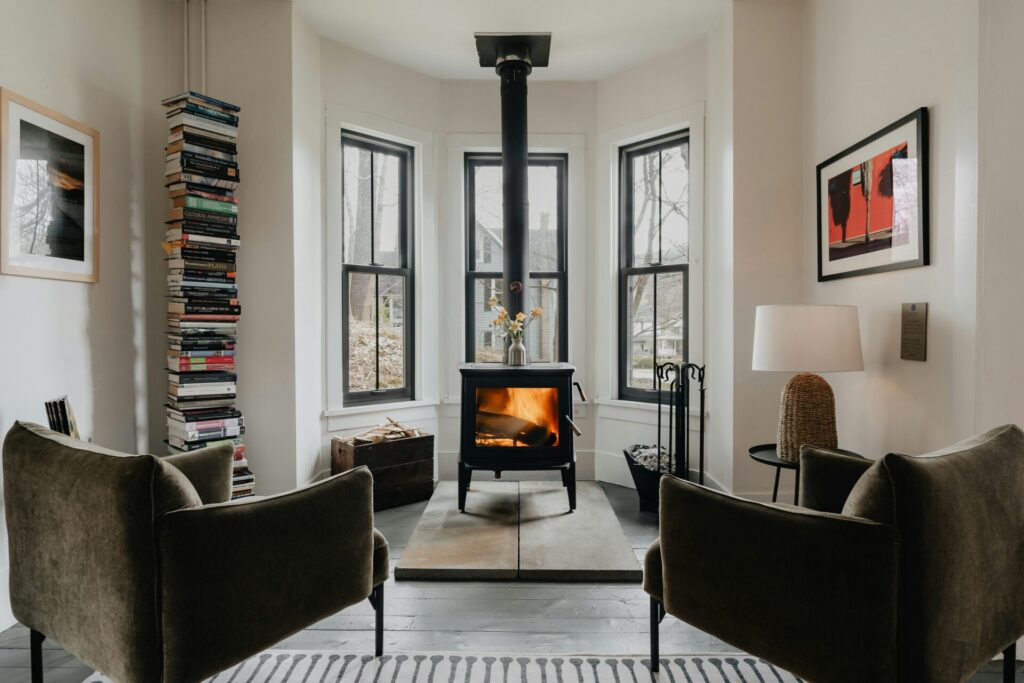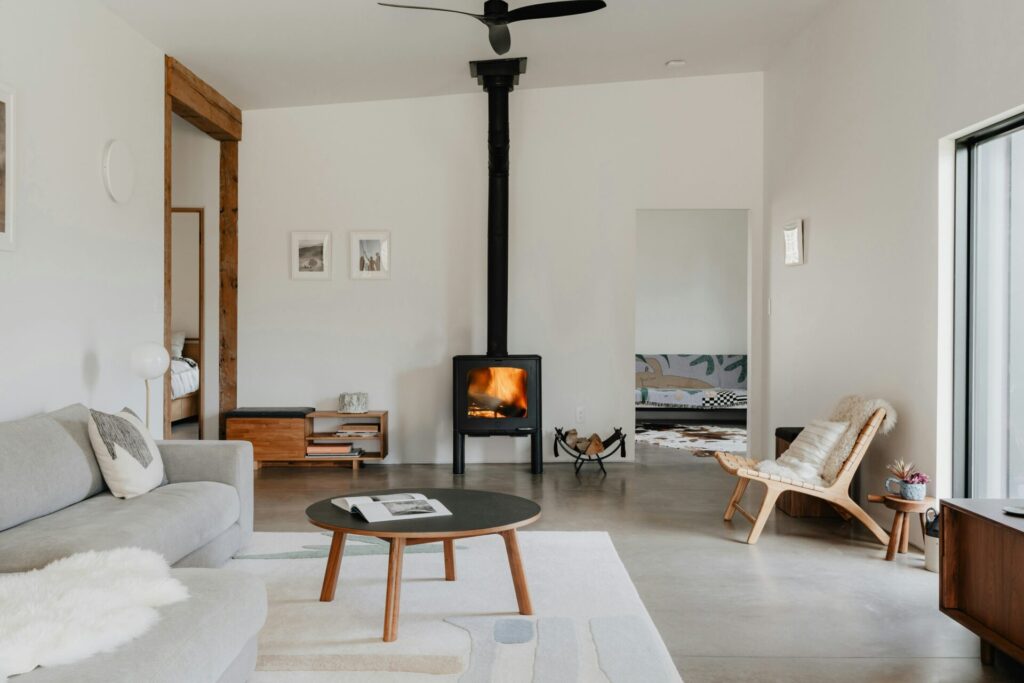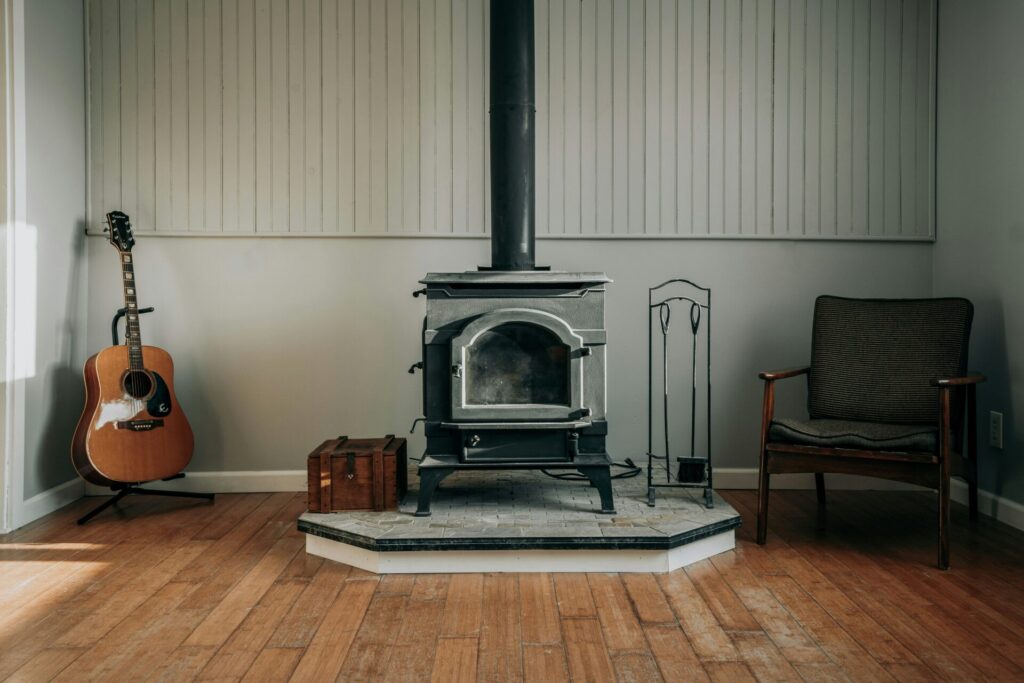Thinking about installing an open fire or wood burner in your Daventry or Rugby home? Wondering if it’s a good idea and how it may impact the value of your property? This comprehensive guide will provide you with all the information you need to make an informed decision. Read our article – Stoves, Open Fires, Wood Burners: A Comprehensive Home Guide.
Understanding Open Fires, Wood Burners, and Stoves
Open fires, wood burners, and stoves each serve the purpose of heating a home. Yet they do so in distinct manners with varying levels of efficiency and ambiance. An open fire, often celebrated for its traditional charm, offers a unique visual and auditory experience, enhancing the atmosphere of any room. However, when it comes to heat output and efficiency, open fires may not be the most effective option. Much of the heat generated escapes through the chimney. Making them less energy-efficient compared to their counterparts.
On the other hand, wood burners and stoves are designed to maximise heat retention and distribution within a space. These options are more enclosed. Which results in a higher percentage of the generated heat being used to warm the room, rather than escaping unused. They are also capable of burning fuel more completely. This means they can operate more cleanly and with greater efficiency. This efficiency not only contributes to lower heating costs but also minimises the environmental impact by reducing emissions.
A local Stove supplier – Complete Stoves – woodburning stoves & multifuel stoves, cheap stoves
Another key consideration is the type of fuel these heating options require. While wood is a common fuel for both open fires and wood burners. Some stoves are designed to operate on multiple fuel types, including coal and pellets. Offering greater flexibility and possibly reducing operating costs further.
Each option has its own set of maintenance requirements, from chimney sweeping to ash disposal, which can influence a homeowner’s decision. The choice between an open fire, wood burner, or stove will largely depend on the homeowner’s priorities. Whether that’s efficiency, atmosphere, or perhaps a balance of both.
Do They Increase Home Value?

Photo by Clay Banks on Unsplash
Open fires and wood burners are often seen as attractive additions to a home by many buyers. Their presence can indeed lead to a potential increase in the value of your property. This effect is particularly noticeable in areas where such features are in high demand. The allure of a crackling fire can make your home stand out in the property market. Potentially making it more appealing to a wider range of buyers.
However, the actual impact on home value can differ significantly based on various factors. The efficiency of the heating system plays a crucial role. More efficient models are likely to be viewed more favourably by prospective buyers. Additionally, the condition of the fireplace or stove is paramount. A well-maintained, stylish wood burner or open fire can serve as a focal point in a room, enhancing its appeal. Conversely, an outdated or poorly maintained system could deter potential buyers.
The preferences of potential buyers can also influence how much value these features add to a home. While some buyers may find the idea of a wood-burning stove charming and a desirable feature. Others may perceive it as an unnecessary hassle or a maintenance burden.
It’s also worth noting that in some areas, local regulations or restrictions on wood burning due to environmental concerns could affect buyer perception. In places with strict air quality rules, the presence of a wood burner might be less attractive to environmentally conscious buyers.
In essence, while open fires and wood burners can enhance your home’s appeal and potentially its market value, the extent of this impact is influenced by the system’s efficiency, condition, and local market preferences.
The Benefits of Having an Open Fire or Wood Burner
One of the most significant advantages of integrating an open fire or wood burner into your home is the unparalleled ambience it creates. The sight of flames dancing and the sound of wood crackling can transform the atmosphere of any room, making it feel warmer and more inviting. This feature alone can turn an ordinary evening into a memorable, cosy experience.
Besides the aesthetic and sensory benefits, these heating options can also lead to substantial savings on energy bills. Open fires and wood burners are capable of producing a significant amount of heat. Potentially reducing the need for central heating during colder months. This is particularly beneficial in areas prone to frequent power outages, as they provide an independent source of heat. Ensuring your home remains warm when it’s most needed.
Environmental considerations also play a role in the appeal of open fires and wood burners. Using wood as a fuel source is inherently renewable, especially when sourced from managed forests or local suppliers. This contrasts with fossil fuels, which are not only finite but also contribute more significantly to greenhouse gas emissions. Opting for a wood burner or an open fire can, therefore, align with a more sustainable lifestyle, reducing your carbon footprint.
Moreover, the versatility in fuel choice with some models adds an extra layer of convenience and efficiency. The ability to use multiple fuels can cater to availability and price fluctuations, ensuring you always have an economical and practical way to heat your home.
The Drawbacks to Consider

Photo by Clay Banks on Unsplash
While considering the introduction of an open fire or wood burner into your home brings with it a host of benefits, there are several drawbacks that must not be overlooked. First and foremost, the ongoing maintenance required can prove both costly and time-consuming. Regular cleaning, chimney sweeping, and inspections to ensure compliance with safety standards are necessary to maintain the system’s efficiency and prevent hazardous situations. These costs can accumulate over time, potentially offsetting the savings made on heating bills.
Another significant consideration is the environmental impact. Despite wood being a renewable resource, the emissions from open fires and wood burners, including particulate matter, can contribute to air pollution. This is a particular concern in urban areas or during periods of high pollution, leading to potential health risks and environmental damage. In response, many regions have introduced restrictions on the use of open fires and wood burners to combat air pollution. Homeowners need to be aware of these restrictions as they could influence the feasibility and legality of using wood-burning heating options in their homes.
Additionally, the installation process itself can be invasive and requires careful planning. The need for a suitable flue or chimney, compliance with building regulations, and ensuring adequate ventilation can add complexity and cost to the installation process.
It’s also worth considering the fuel storage requirements. Wood and other solid fuels need to be kept dry and easily accessible, which can pose a challenge for those with limited storage space.
Understanding these drawbacks is crucial for homeowners to make a well-informed decision that aligns with their preferences, lifestyle, and local regulations.
Safety and Regulations
Safety is paramount when installing and using open fires, wood burners, or stoves in your home. Adherence to safety guidelines and local regulations is essential to safeguard the health of occupants and the structure of the property. It is advisable to engage with professionals for the installation to ensure it meets the current building and fire regulations.
Regular maintenance, including chimney sweeps and inspections, is critical to prevent fire hazards and ensure the system operates efficiently. Homeowners must also be aware of any area-specific restrictions or permits required by local authorities.
Wood/Stove regualtions – Building Regulations Guidance for wood burning stoves (hetas.co.uk)
This may involve understanding the environmental regulations that limit the use of certain fuels or dictate the types of burners that can be installed, especially in areas with air quality management policies.
Additionally, ensuring that the correct fuel is used and stored safely is important to prevent accidents and maintain air quality. Compliance with these safety and regulatory requirements not only protects your home and environment. It also ensures that your heating system remains a valuable and functional feature of your property.
Making the Right Choice for Your Home

Photo by Seiya Maeda on Unsplash
When considering adding an open fire, wood burner, or stove to your home, there are several key factors to take into account. Evaluate the heat output and efficiency of each option. A more efficient system will not only save you money on heating costs in the long term but also reduce your environmental impact. Keep in mind the initial and ongoing costs associated with each option. Installation expenses, fuel prices, and maintenance activities such as chimney sweeping can vary widely between different heating systems.
It’s also important to assess the maintenance requirements of your chosen heating solution. The need for regular cleaning and the potential for repairs should fit within your lifestyle and budget. Additionally, consider seeking advice from professionals in the field. An Estate Agent can provide insights into how each option might affect your home’s market value and appeal to potential buyers. Similarly, a fireplace specialist can offer detailed advice on the practical implications of installation, including compliance with local regulations and the suitability of your property for certain types of fires or stoves.
More choices – Stoves Are Us – Shop Online, Free Next Day Delivery | Stoves Are Us
Ultimately, your decision should align with your personal preferences and living situation. Whether you prioritise enhancing the atmosphere of your home, reducing heating bills, or minimising your environmental impact. Ensure the solution you choose meets your needs and complies with any local restrictions or requirements. By carefully considering these factors, you can make an informed decision that adds warmth and value to your home.
Stoves, Open Fires, Wood Burners: A Comprehensive Home Guide
Has our blog – Stoves, Open Fires, Wood Burners: A Comprehensive Home Guide raised that interest in a wood burner?! Or are you undecided, maybe you are considering selling your home? Either way, if you would like any more advice or information, or need your property valuing, just gives us a call.
You can reach Skilton & Hogg Estate Agents on 01327 624275 or 01788 486100. Or, click here to send us your details and we will call you.




